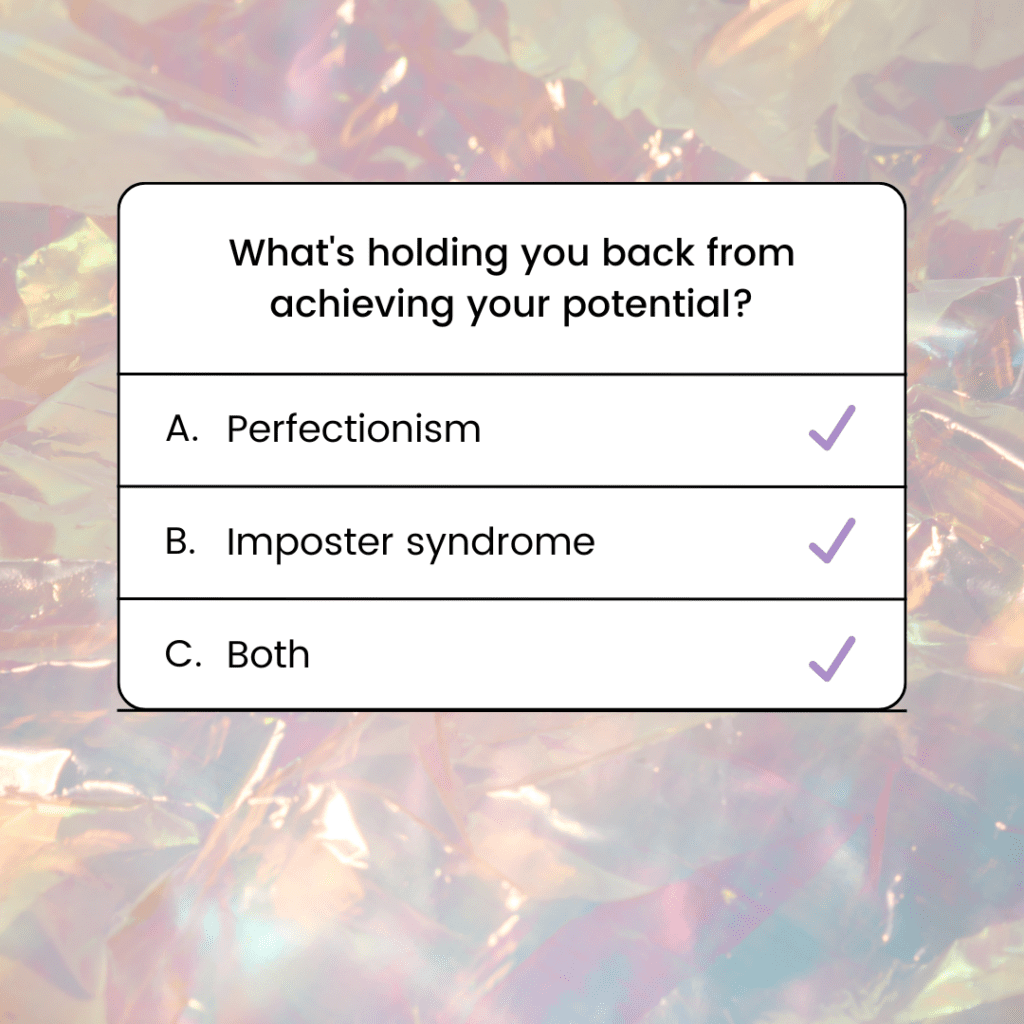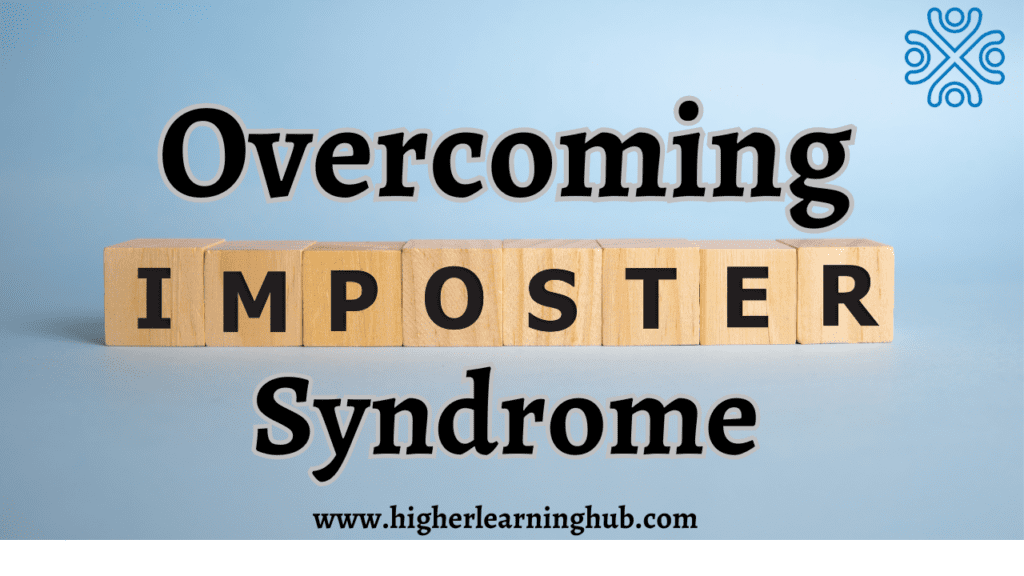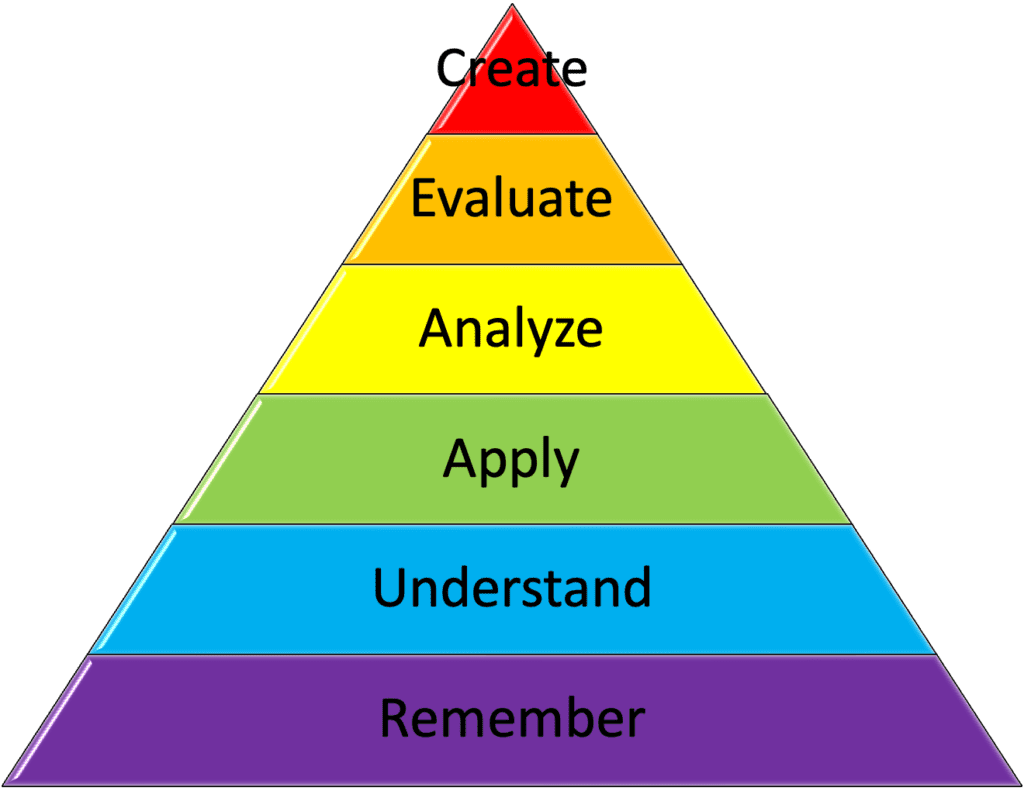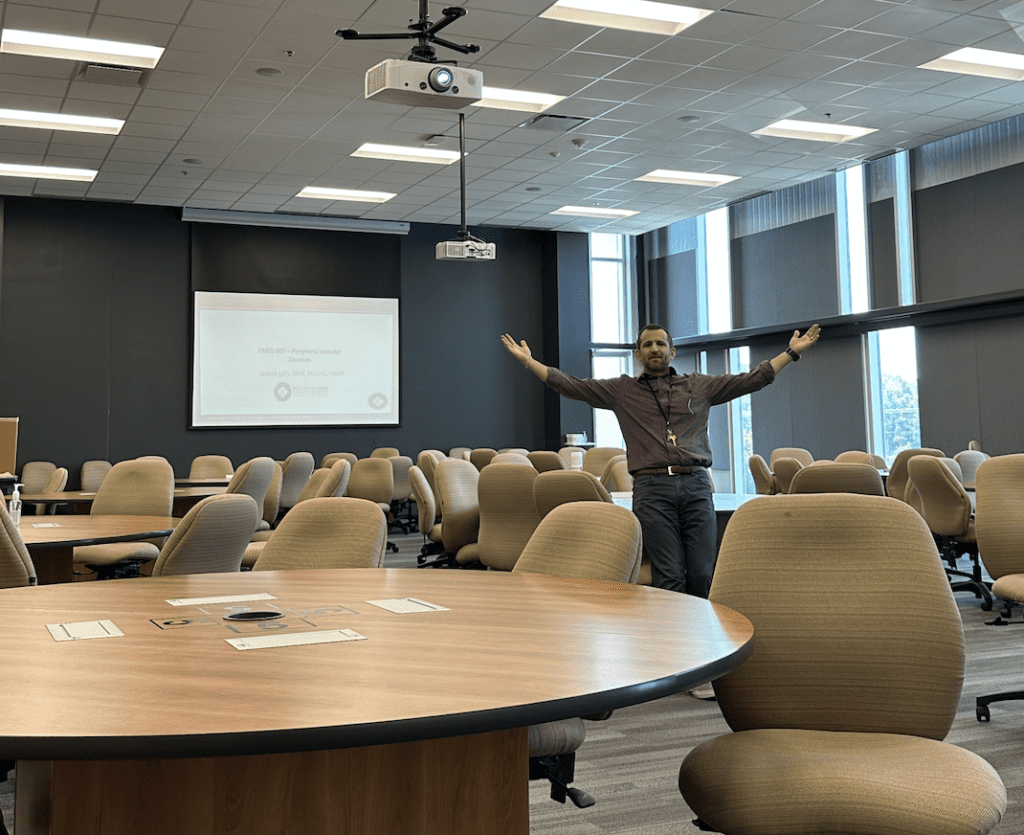Authored by Dr. Leland Jaffe; Associate Dean and Professor; Published on September 21, 2024
Have you ever felt like you’re faking it till you make it? – I’ve certainly been there! Imposter syndrome is surprisingly common among young academics and professionals.
I first entered the world of academia in 2015, about 5 years after I went into clinical practice. I never had formal training as an educator, and during those early years, I certainly experienced imposter syndrome, which took some time to overcome. It can sap your confidence, leaving you feeling like you don’t belong in the same league as your peers. This mental struggle can undermine your progress and affect your mental health, making it hard to focus on what truly matters: the education of the students or the job at hand. But here’s the good news. You’re not alone, and there are strategies you can use to manage these feelings. In this post, we’ll explore practical steps you can take to maintain your self-belief and keep imposter syndrome at bay, helping you to thrive in your academic journey.
Understanding Imposter Syndrome
Imposter syndrome is something many of us experience, especially when starting our academic journey. It’s that nagging feeling that you’re not as capable as others think you are. This can hit hard for young professionals stepping into academia. Let’s take a closer look at what imposter syndrome is and why it’s so common in this field.
Definition and Characteristics
Imposter syndrome is the persistent doubt in one’s abilities despite evident success. People experiencing it often feel like frauds. Some common characteristics include:
- Feelings of Inadequacy: No matter how much you achieve, you might still feel like you’re not good enough.
- Self-Doubt: Constantly questioning your abilities and achievements.
- Attributing Success to External Factors: Instead of recognizing your skills and hard work, you might believe your success is due to luck or other people’s help.
This mental turmoil can create a cycle—achievements lead to praise, which then leads to anxiety about being “found out” as a fraud. Ever felt this way? You’re definitely not alone.
Prevalence in Academia
Imposter syndrome is particularly prevalent in academic settings. Here’s why:
- Highly Competitive Environment: Academic success often relies on competition which can exacerbate self-doubt.
- High Standards: The demand for excellence in academia is high, leading many to feel they don’t measure up.
Statistics reveal the scope of imposter syndrome in academia:
- Approximately 70% of people will experience at least one episode of imposter syndrome in their lives, according to the International Journal of Behavioral Science.
- In academic settings, nearly 50% of students and early-career staff and faculty report feelings of inadequacy and doubt, reinforcing the notion that these environments can foster such sentiments.
This data underscores the fact that imposter syndrome is a shared struggle for many, particularly as they navigate the pressures and expectations within academia.
Identifying Triggers of Imposter Syndrome
Many young professionals find themselves questioning their capabilities in this demanding environment (as did I in my earlier years of being an educator). At the heart of these concerns is often imposter syndrome—an all-too-common phenomenon where individuals doubt their accomplishments and fear being exposed as frauds. By understanding what triggers these feelings, you can better prepare to overcome them. Let’s dive into some key triggers.
Academic Environment


In academia, competition the pressure to excel can be overwhelming. Young professionals face constant assessments, from evaluations to peer reviews.
Consider these factors:
- Constant Evaluation: Frequent student and administration evaluations/reviews mean you’re always under scrutiny.
- Prestige and Reputation: Institutions often emphasize accolades, making failures seem damaging.
These elements can foster a doubtful mindset, convincing some that they’re just not good enough, leading to persistent self-doubt.
Social Comparison
In an academic setting, comparison is almost unavoidable. Peers and mentors constantly surround you; their achievements can feel like a mirror reflecting your insecurities. This kind of social comparison can severely impact your self-esteem.
Here’s how it plays out:
- Peer Achievements: Watching peers achieve great things might make you question your own successes.
- Mentor Dynamics: Admiring a mentor can sometimes morph into feeling inadequate next to their expertise.
- Highlight Reels: In the age of social media, everyone’s best moments are on display, creating unrealistic benchmarks.
These comparisons often distort reality, making you forget the hard work and talent that got you where you are.
Perfectionism


Many in academia strive for nothing less than perfection. While this drive can lead to impressive accomplishments, it also lays the groundwork for imposter syndrome.
Here’s why perfectionism is a slippery slope:
- Impossible Standards: Setting overly ambitious goals can make success feel out of reach.
- Fear of Failure: Even minor setbacks are seen as monumental failures.
- Continuous Critique: Focusing excessively on flaws boosts insecurity and erodes confidence.
Perfectionism demands flawlessness, but in reality, growth often comes from learning through mistakes. Embracing imperfections can help diminish the grip of imposter syndrome. I have learned a great deal through taking chances and making mistakes.
By identifying these triggers, you can start crafting strategies to counteract them. Recognizing that these feelings stem from external pressures is the first step toward releasing their hold and embracing your accomplishments without doubt.
Strategies to Combat Imposter Syndrome
Navigating academia as a young professional can be daunting, with the ever-looming cloud of imposter syndrome hanging overhead. It’s that nagging voice inside your head that questions your achievements. But remember that you’re not alone, and there are effective strategies to tackle it. Let’s dive into some practical approaches to help you feel more at ease and confident in your professional journey.
Building a Support Network
In academia, a strong support network can be a lifeline. Mentors and peer support groups play a crucial role in combating imposter syndrome. They offer a safe space to share your experiences and concerns. Finding a mentor who understands your field can provide invaluable guidance and reassurance. Meanwhile, connecting with peers facing similar challenges can foster a sense of community and encouragement. Remember, you are not alone in this journey; many have walked a similar path and can share their insights. Consider joining our private Facebook Group to help support others in the academic world.
Reframing Negative Thoughts
Negative thoughts can derail your confidence and growth as an educator. However, with cognitive restructuring techniques, you can reshape these thoughts. Start by identifying self-doubt and negative self-talk. Ask yourself, “Is this thought based on fact or fear?” Challenge these thoughts by focusing on evidence of your achievements and strengths. Practice shifting your mindset by replacing negative phrases with positive affirmations. Over time, you’ll find your inner critic becoming quieter.
Setting Realistic Goals
Setting goals is essential to establish realistic and achievable goals that align with your capabilities. Break down larger objectives into smaller, manageable tasks. Celebrate each small success, no matter how minor it seems. These mini-victories build confidence and gradually diminish feelings of inadequacy. Through achievable goals, you are constantly reminding yourself of your competence and progress.
Seeking Professional Help
Sometimes, imposter syndrome can feel overwhelming, and that’s when seeking professional help is vital. Don’t hesitate to reach out to a counselor or therapist. These professionals can offer strategies to manage stress and anxiety associated with imposter syndrome. Therapy provides a non-judgmental environment to explore these feelings and develop coping mechanisms. Remember, asking for help is a strength, not a weakness. It shows your commitment to personal growth and well-being.
Your journey through academia is unique, and while imposter syndrome is a common hurdle, it doesn’t define your potential. By building a network, reframing negative thoughts, setting goals, and seeking help, you equip yourself with powerful tools to forge ahead with confidence.
Long-Term Perspective on Career Development
Navigating academia as a young faculty member can sometimes feel daunting. Adopting a long-term perspective can help you chart a successful course. With patience and perseverance, every lesson learned becomes a stepping stone toward future success. Understanding imposter syndrome not only equips you with strategies to combat it but also empowers you to harness your personal and professional growth over time.
Embracing Lifelong Learning
In the ever-evolving landscape of academia, why not treat every challenge as a chance to build your knowledge? Some might see these challenges as threats, but shifting your outlook can transform them into learning opportunities. An approach focused on lifelong learning allows you to view each obstacle as a valuable lesson, making the learning process both rewarding and motivating.
Consider asking yourself:
- What can I learn from this experience?
- How does this challenge fit into my broader career goals?
By reframing challenges, you open yourself up to continual improvement. Lifelong learning encourages curiosity and exploration, lighting the path to unforeseen accomplishments in your academic journey.
Developing Resilience
Resilience is an essential trait for anyone facing the demanding expectations of academia. Overcoming imposter syndrome isn’t just about feeling more confident in the moment; it’s about forging a stronger, more resilient version of yourself. The ability to face setbacks and still move forward is important to continue to grow. When you learn to manage self-doubt, you’re essentially building your emotional toolkit for future challenges.
Start with small steps:
- Acknowledge Self-Doubt: Recognize when you’re feeling like an imposter. Naming the emotion is the first step to mastering it.
- Connect with Peers: Sharing feelings with trusted colleagues can offer support and alternative viewpoints. Consider joining our private Facebook Group to connect with others in academia.
- Celebrate Small Wins: Every achievement, no matter how minor it may seem, is a victory against imposter syndrome.
Resilience requires practice, much like any skill, and you’ll find it improving over time with mindful effort. Embracing challenges with a sturdy mindset not only prepares you for personal growth but also enhances your professional journey in academia.
Imposter Syndrome – Conclusion
Recognizing achievements and seeking support stand as critical components in overcoming imposter syndrome for young academics and professionals. Many talented individuals often question their worth, but it’s vital to celebrate successes, no matter how small they seem.
Engaging with mentors and peers provides insight and reassurance, reminding us we are not alone in our journey. Embrace feelings of self-doubt as opportunities for growth, rather than obstacles. This shift in perspective can lead to greater self-confidence and academic fulfillment.
Reflect on your accomplishments and actively seek feedback. These practices foster resilience and a more robust professional identity.
Start today by acknowledging your contributions and asking for guidance when needed. By doing so, you’ll not only banish imposter syndrome but also pave the way for a more rewarding career.







